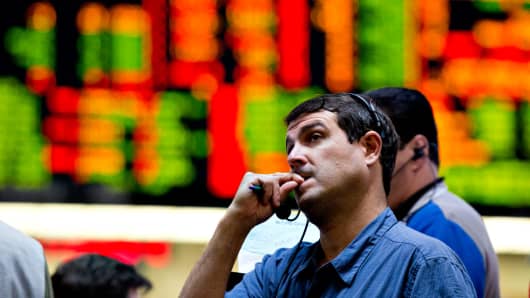Euro zone policymakers should take a leaf out of the Federal Reserve's book when it comes to stimulating growth, as the rift between the world's two largest economies widens, according to analysts.
On Monday, gross domestic figures showed that Spain's economy fell back into recession, with the debt crisis and austerity measures biting, and analysts fear that euro zone GDP figures due to be released on May 15 will show the single currency area as a whole slipped back into recession as well.
By contrast, the US economy will continue to growth, albeit at a moderate pace, "undermined by deleveraging by both the private and public sectors," according to Lee Hardman, currency economist at Bank of Tokyo-Mitsubishi UFJ.
"While the U.S. economy continues to grow at only a moderate pace, it is still outperforming most of Europe which is in or close to recession, with real GDP in the US now standing around 1.3 percent above its pre-financial crisis peak compared to it still being around 4.3 percent, 2.4 percent, and 3.6 percent below pre-financial crisis peaks in the UK, euro-zone and Japan respectively," Hardman wrote.
European leaders have just begun to turn their rhetoric towards the need to boost growth, pushed both by electorates tired of austerity as well as by markets nervous about a spiral of austerity and economic contraction.
On Monday afternoon,European stocks halted a four-session rally as fears of the deep bite of the debt crisis prevailed.
Wall Street has gone it alone and it "has not done badly thus far," Mike Lenhoff, chief strategist at brokerage house Brewin Dolphin, wrote in a research note.
U.S. first-quarter GDP came in slightly lower than expectations according to data released last Friday, slowing to a 2.2 percent annualized rate of growth from 3 percent in the fourth quarter of last year and compared with expectations for a 2.5 percent growth rate.
The Fed's Way
However, ING economist James Knightley noted, the detail was better, with private sector demand up strongly. Household consumption rose 2.9 percent and private investment was up by 6 percent, led by a 19.1 jump in residential construction.
Government spending will remain under downward pressure and a recession in Europe will not be good for exports, Knightley added.
"That said, the domestic story in the U.S. remains good with the economy creating jobs and corporates sat on large cash piles that will hopefully get put to work," he said.
Lenhoff pointed out that the Fed's efforts to kick-start the economy as the crisis hit - such as its two rounds of quantitative easing and the central bank's willingness to leave rates at a record low for a long time – are coming through on companies' earnings, which "are rising to new record highs."
"Nowhere else in the major economies is this happening," he wrote.
"Nor has any other major market been as great a performer throughout the risk-on, risk-off phase of recent years as the S&P 500 . Not only is it outperforming in difficult markets but it has also hit new post-financial crisis highs, which is something other major equity markets have been unable to do."
The next meeting of the Federal Open Markets Committee is scheduled for the 30th of June and some Fed officials have indicated that the central bank was reluctant to take any further action for the moment.
All eyes will be on U.S. nonfarm payrolls data, which are going to be release on Friday, to see whether the jobs market is finally getting out of the doldrums.
"With earnings reaching new highs and GDP growth regaining momentum, it seems hard not to conclude that the prospects for job creation are looking up," Lenhoff wrote.
His view is backed by ING's Knightley. "The domestic story in the U.S. remains good with the economy creating jobs and corporates sat on large cash piles that will hopefully get put to work," Knightley wrote, adding that the third round of quantitative easing looks unlikely in the U.S. but it is the euro zone that needs more stimulus.
The Fed is committed to growth and "acutely aware" of the risk to the outlook of the problems in global financial markets, Lenhoff said.
"The Fed is gunning for reflation and not willing to let up until it gets it," he wrote. "Meanwhile, Europe is stagnating, Japan is struggling – still – with deflation and Wall Street is backing the Fed."



